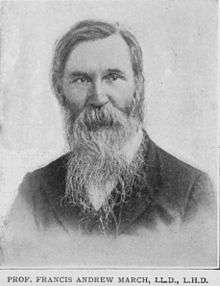Francis March

Francis Andrew March (October 25, 1825 – September 9, 1911) was an American polymath, academic, philologist, and lexicographer. He is considered the principal founder of modern comparative linguistics in Anglo-Saxon.
Life and career
March was born in Millbury, Massachusetts. He graduated from Amherst College in 1845, and received a M.A. degree from Amherst in 1848. After studying law and teaching for three years, he became instructor at Lafayette College. March occupied the chair of English language and comparative philology at Lafayette College, in Easton, Pennsylvania, from 1857 to 1907. It was the first post of its kind. March was one of the first professors to advocate and teach English in colleges and universities.
March applied the methods of studying the Latin and Greek classics towards the study of English literature, and led the way for the first scientific study of the English language.
In addition to English, March also taught French, German, Greek, Latin, botany, "mental philosophy", political economy, the Constitution, and law.
He also served as president of the American Philological Association (1873–1874; 1895–1896), the Spelling Reform Association (after 1876), and the Modern Language Association (1891–1893). He was elected a member of the American Antiquarian Society in 1881.[1]
March was the first American superintendent over the volunteer reading program of the Oxford English Dictionary, thus providing valuable support to James Murray in the compilation of this monumental work.
He was the father of historian Francis Andrew March and General Peyton C. March who was chief of staff of the United States Army during the First World War.
Bibliography
- A Comparative Grammar of the Anglo-Saxon Language (1870)[2] (reprinted, 1977). Based on ten years of intensive research, the work examines the relationship of Anglo-Saxon to Sanskrit, Greek, Latin, and five Germanic languages.
- Method of Philological Study of the English Language (1865)[3]
- Latin Hymns with English Notes (1874)[4]
- An Anglo-Saxon Reader (1882)[5]
- The Spelling Reform (1893),[6] a contribution to the reform of English orthography.
Edited Works
- March served as editor of the Douglass Series of Christian Greek and Latin Writers, to which he contributed Latin Hymns.
- With his son Francis Andrew March (1863–1928), he edited A Thesaurus Dictionary of the English Language (1903; 2nd ed., 1980).
- Collaborated with Richard J Bemis on A History Of The World War, with an introduction by his son General Peyton C. March which was published in 7 volumes. (1919)
Death and legacy
March was the father of General Peyton Conway March, aide to Gen. MacArthur in the Spanish–American War and Army Chief of Staff from May 20, 1918 – June 30, 1921.
March died at Easton, Pennsylvania. A chaired professorship now exists at Lafayette College to honor his achievements in the field of English.
Francis A. March Elementary School, near the Lafayette Campus, is named in his honor.
March Field, on the Lafayette College Campus, is named in honor of his son, Francis Andrew March, Jr.
References
- ↑ American Antiquarian Society Members Directory
- ↑ Francis Andrew March (1870). A comparative grammar of the Anglo-Saxon language: in which its forms are illustrated by those of the Sanskrit, Greek, Latin, Gothic, Old Saxon, Old Friesic, Old Norse, and Old High-German. Harper.
- ↑ Francis Andrew March (1865). Method of philological study of the English language. Harper & brothers.
- ↑ Francis Andrew March (1874). Latin hymns, with English notes: For use in schools and colleges. Harper & brothers.
- ↑ Francis Andrew March (1882). Anglo-Saxon Reader. Harper & Brothers.
- ↑ Francis Andrew March; United States. Bureau of Education (1893). The spelling reform. Government Printing Office.
Sources
 Beach, Chandler B., ed. (1914). "March, Francis Andrew". The New Student's Reference Work. Chicago: F. E. Compton and Co.
Beach, Chandler B., ed. (1914). "March, Francis Andrew". The New Student's Reference Work. Chicago: F. E. Compton and Co. Chisholm, Hugh, ed. (1911). "March, Francis Andrew". Encyclopædia Britannica (11th ed.). Cambridge University Press.
Chisholm, Hugh, ed. (1911). "March, Francis Andrew". Encyclopædia Britannica (11th ed.). Cambridge University Press. Chisholm, Hugh, ed. (1922). "March, Francis Andrew". Encyclopædia Britannica (12th ed.). London & New York.
Chisholm, Hugh, ed. (1922). "March, Francis Andrew". Encyclopædia Britannica (12th ed.). London & New York.- March, Francis A. (2005). Schlueter, Paul; Schlueter, June, eds. Francis A. March: Selected Writings of the First Professor of English. Easton, PA: Lafayette College. ISBN 0-9765162-0-9.
- Simon Winchester, The Meaning of Everything (Oxford: Oxford University Press, 2003).
External links
- Works by or about Francis March in libraries (WorldCat catalog)
- "Oxford University Press Selects Jessica Lasak '05 for First Francis March Research Internship". Lafayette College. Archived from the original on October 15, 2004.